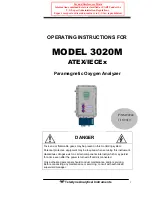
5.0 OPERATION
Previous sections have shown how the unit may be configured for user applications.
This section shows how the user may access additional information from the Display
PV mode and an explanation of how the instrument processes input data and activates
outputs.
5.1 USER OPERATION
There are a number of facilities available from the Display PV mode using the front
panel keys. These are summarised in the table below.
In addition, it is possible to get into Menu Mode by pressing
OPERATION
USER OPERATION
followed by
Page 68
Summary of Contents for DM4000U
Page 3: ...GETTING STARTED Page 3 ...
Page 7: ...INSTALLATION Page 7 ...
Page 25: ...USER GUIDE Page 25 ...
















































